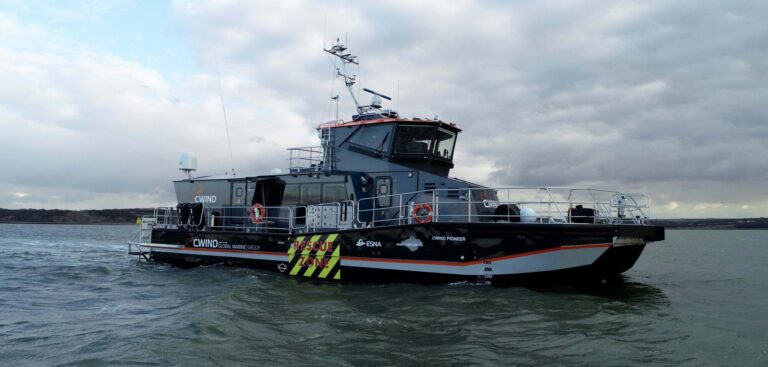Testing, inspection and certification (TIC) company Bureau Veritas (BV) has announced the classification of a hybrid-powered surface effect ship (SES) named the CWind Pioneer.
Stated to be the first vessel of its kind classified with a hybrid diesel and battery electric power system, the CWind Pioneer can operate purely on battery power when traveling at slow speeds in restricted waterways or when on standby in wind farms.
Capable of reaching speeds over 43kts, the vessel has the capacity to carry 24 passengers and crew and is used to provide cost-effective services to wind farms located offshore, namely the Borssele 1 and 2 wind farms in the Netherlands. Featuring an air cushion and twin hulls, the vessel can also transfer passengers safely in harsh weather conditions where waves may reach a height of up to 2m, reducing ship downtime.
“Through the diversity of our fleet, Bureau Veritas has built high technical expertise which helps support the development of the CWind Pioneer’s step-change design and eco-friendly operations,” commented Herman Spilker, vice president of North Europe, Bureau Veritas. “We are proud of this superb achievement, and we wish its technicians and crew safe and comfortable sailing.”
BV’s notation ‘Electric-Hybrid’ addresses the propulsion system’s complexity and defines certain requirements for storage, power distribution, control and instrumentation. The notation also outlines tests that must be carried out, specifically those relating to power management and critical safety considerations like thermal runaway.
“The success of the CWind Pioneer was achieved through years of research and development, resulting in the fastest, safest and most fuel-efficient CTV on the market,” explained Nathanael Allison, managing director, CWind.
“By working together with industry bodies, including Bureau Veritas, our clients, Ørsted, and a range of highly qualified naval architects, shipbuilders and marine engineers, including our in-house team, we have managed to achieve something truly exceptional. As the CWind Pioneer continues to perform well in-field, we will also be able to track a wealth of data to adapt and improve the performance of our hybrid vessels in the future.”



